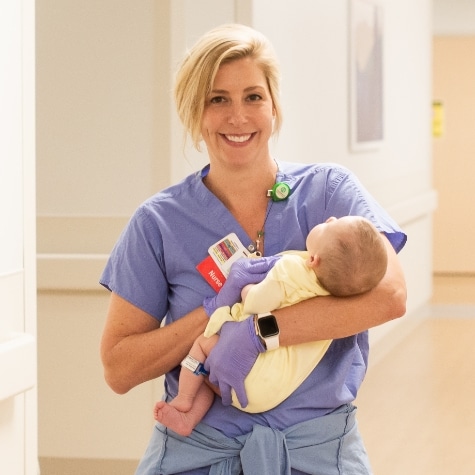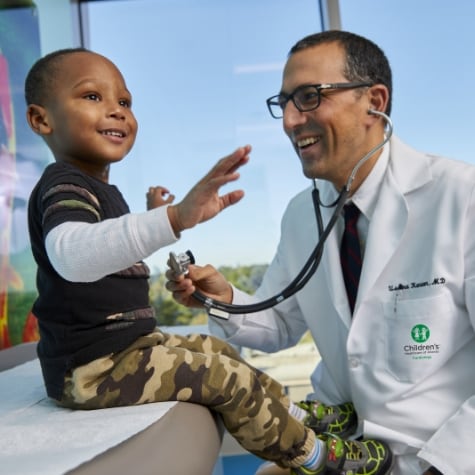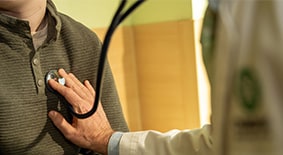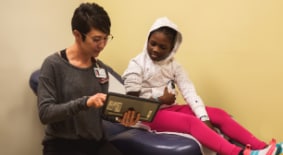What is an Atrial Septal Defect (ASD)?
An atrial septal defect (ASD) is a hole in the wall, or septum, between the two upper chambers of the heart. It is a congenital heart defect, which means that it is present at birth.
When an atrial septal defect is present, blood flows through the hole primarily from the left atrium to the right atrium. This shunting increases the blood volume in the right atrium, which means more blood flows through the lungs than normal.
There are a few different types of ASDs:- Patent foramen ovale (PFO): This occurs before a baby is born and is a natural hole in the heart required for adequate flow through the heart. This small hole may remain open after birth. It is typically detected through fetal echocardiograms.
- Secundum ASD: This occurs in the middle part of the atrial septum.
- Primum ASD: This occurs in the lower part of the atrial septum near the tricuspid and mitral valves.
- Sinus venosus: This occurs in the upper part of the atrial septum near the veins that drain into the left and right atriums.
- Coronary sinus ASD: This occurs when there is a defect in the wall between the coronary sinus and the left atrium.
Fortunately, ASDs do not cause significant symptoms in most children. If left untreated, however, atrial septal defects may cause problems in adulthood. These problems may include pulmonary hypertension, congestive heart failure and an increased risk of stroke.
How is an ASD diagnosed?
An ASD is often diagnosed after a physician hears a heart murmur, which is caused by the abnormal flow of blood through the heart. ASDs are often found through cardiac ultrasounds since most children do not have symptoms related to the ASD.
Your child may then be referred to a pediatric cardiologist, who may conduct the following tests to examine your child’s heart:
- Electrocardiogram (ECG): This test shows the electrical activity of the heart, including abnormal rhythms, or arrhythmias, that can be caused by an ASD.
- Echocardiogram (echo): This test uses sound waves to make a moving picture of the heart and heart valves. It can also show the blood flow through the atrial septal opening and find out how big the opening is.
- Cardiac catheterization: This test uses a catheter, or thin tube, that is placed near the heart to show a picture of the heart. It can also be used to close an ASD.
What are symptoms of an ASD after a baby is born?
ASDs typically do not cause symptoms in babies. Some children with large ASDs may have lower energy levels and may feel more during while running.
Other symptoms may include:
- Shortness of breath
- Fatigue
- Swelling of the legs, feet or abdomen
- Heart palpitations or skipped beats

Heart Catheterization for Kids
A heart catheterization is a minimally invasive procedure to diagnose and treat certain heart conditions. Learn more about this procedure.
learn moreHow is an ASD treated?
Some small ASDs can close on their own while your child is still young, and your child’s cardiologist may want to wait and see if it closes on its own.
If the ASD is large or doesn’t close on its own, your child’s cardiologist may recommend the following treatment options:
- Cardiac catheterization: An interventional cardiologist will insert a catheter through a large vein in your child’s leg and then guide it up to his heart. A device, which will be determined based on your child’s specific ASD, is then put through the catheter to close the hole.
- Open heart surgery: Surgery may be required if the hole lacks the heart tissue needed to support an ASD device. Surgeons will use stitches or patches to close the hole.
Most children recover quickly from an ASD repair and don’t experience additional heart problems. It is important to have continued care from your child’s pediatric cardiologist throughout his life to monitor the heart.
What is the future like for a child born with an ASD?
Most children who have an ASD repair are expected to make a full recovery and will go on to live healthy, productive lives while also receiving continued care from their pediatric cardiologists.
Adults who have had an ASD repaired or closed surgically may need to be evaluated by a cardiologist periodically, depending on their situation. Oftentimes, an ASD can be detected for the first time during adulthood.

Pediatric Cardiology
Pediatric cardiologists specialize in the diagnosis, treatment and management of congenital heart defects and acquired heart disease in infants, children, teens and young adults.
learn moreAdvancements and Innovation in Pediatric Heart Care
Meet Our Cardiothoracic Surgery Team
At Children's, our cardiothoracic surgery team is dedicated to the well-being and care of children of all ages—from birth to 21—who have been diagnosed with a congenital heart defect.
- Paul Chai, MD, Chief of Cardiothoracic Surgery and Co-Chief of the Children's Heart Center
- Joshua Rosenblum, MD, PhD
- Subhadra Shashidharan, MD
- Fawwaz Shaw, MD
- Kimberly Woodall, CPNP
- Melanie McBrayer, CPNP





